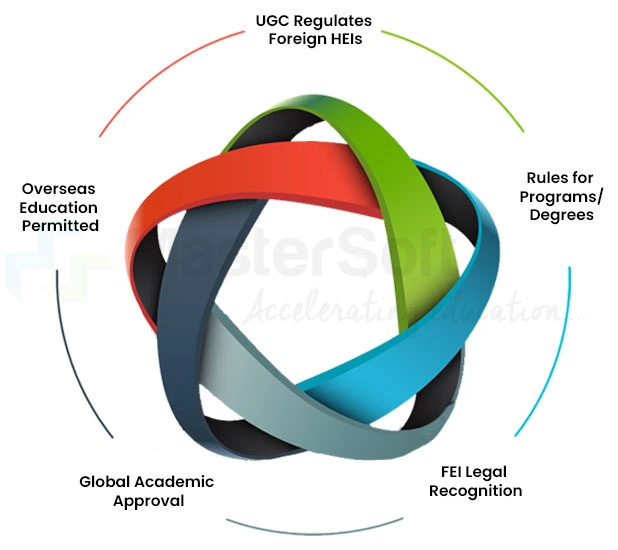23, Jan 2024
The Indian government and the University Grants Commission (UGC) are focused on internationalising education in India. In line with the National Education Policy 2020 (NEP 2020), the UGC has decided to allow foreign higher education institutions (FEIs) to establish their campuses in India. This involves provisions for establishing an Office for International Affairs and an Alumni Connect Cell in Indian universities.
The UGC intends to promote better academic collaboration between foreign HEIs and Indian HEIs through this move. For this, the UGC amended the Gazette in May 2022 with the “UGC (Academic Collaboration between Indian and Foreign Higher Education Institutions to Offer Twinning, Joint Degree and Dual Degree Programmes) Regulations, 2023”.
National Education Policy 2020 - Make Your Institute Ready For NEP-2020
The NEP 2020 guidelines include a goal to help top international universities to operate in India. It dictates setting up a statute law that facilitates giving special consideration regarding content, governance, and regulatory norms to high-ranking foreign HEIs which is on par with other autonomous educational institutions in the country. This move by the UGC is set to bring significant changes in overall education quality and professional proficiency for students in India.
With this regulation, the UGC aims to provide a global aspect to higher education, permit Indian students to acquire foreign qualifications at affordable cost and make India a popular global destination for higher education. This regulation will make it easier for renowned foreign universities to enter the Indian higher education market.
Key Points of UGC’s Academic Collaboration Regulations for Foreign HEIs

The UGC has prescribed certain specific rules, regulations, and criteria for allowing foreign HEIs to establish their campuses in India. These regulations determine the entry and operations of non-Indian universities and higher education institutions in India. The regulations dictate how foreign HEIs can offer undergraduate, post-graduate, doctoral, post-doctoral, and other higher education programs in the country. They also prescribe how foreign HEIs can award certificates, diplomas, and degrees in different disciplines.
Let us first understand how the UGC defines a foreign higher education institution.
According to the UGC terminology, an FEI is any educational institution that is recognised legally, such as a trust, society, company, or statutory educational entity from a country other than India. It should have legal approval in its original country to provide academic courses and research programmes to undergraduate and higher levels of education. This permission should extend to providing education services within the country and overseas.
Eligibility Criteria for FEIs To Set-up Campus in India
Normally, the UGC does not allow any foreign HEI to set up campus, or even impart education in India without its prior approval. So, if an FEI seeks to establish a campus in India and provide higher education to students, it needs to fulfill certain criteria as dictated by the UGC.
The eligibility criteria for FEIs to establish a campus in India and provide education include -
- The applicant should be a foreign university or FEI that has secured a position in the Top 500 rankings for overall performance, or in the subject-wise category.
- The foreign HEI applying to open campus in India should be a reputed and well-known educational institution in its home country.
These are the two main eligibility criteria that are dictated by the UGC to help foreign HEIs and universities set up a campus in India.
Overcoming Challenges In Indian Higher Education
Application and Approval Process for FEIs to Set-up Campus in India
If the eligibility criteria are fulfilled then the foreign university or FEI needs to follow these steps to apply for, and get approval to set up campuses in India -
- Download and fill out the application form provided on the UGC website at - https://fhei.ugc.ac.in/
- Pay the processing fee as described in the form. Remember, this is a non-refundable fee and can be changed by the UGC frequently.
During the application process, you will need to attach several important documents with your application form and upload them on the UGC portal. These documents include -
- Permission Letter by the Governing Board or Body from the home country to establish a campus for education in India.
- Detailed information about the proposed infrastructure, facilities, faculty availability, fee structure, courses, academic curriculum, financial resources, and other details that are relevant and may be needed to set up operations in India.
- Details of alternate plans to relocate or reallocate students to new programs, courses, etc. as a safeguard against disruption, discontinuation, or closure of the campus in India.
- Commitment to impart a quality of education that is on par with the FEI's main campus in its home country.
- Ensuring that the qualifications awarded to Indian students are equivalent in value and recognised globally, the same as qualifications awarded to students at the FEI’s home country, so Indian students can qualify for continued education and employment.
- Most recent quality assurance and/or accreditation report from a recognized authoritative body.
- All documents that are specified in the application portal.
Once the FEI has submitted the application and required documents on the portal, the UGC will create a Standing Committee to review the application. During this, the committee will evaluate applicants based on the following aspects -
- Merits of students in existing campus
- Credibility and reputation of the foreign HEI
- Programmes to be offered at the Indian campus
- Potential to enhance educational opportunities
- Proposed academic infrastructure
The Standing Committee will make recommendations to the UGC within 45 days from the date of applying. Once the UGC receives the committee’s recommendations, it will make the final decision within the next 45 days.
After this, the UGC may grant in-principle approval and also send a Letter of Intent to the foreign HEI. This gives the FEI a maximum of 2 years to set up a campus in India from the date of approval. The UGC may decide to offer an extension for setting up a campus if required, depending on individual cases.
The FEI is required to convey its readiness to start academic operations to the UGC. The standing committee will then evaluate the FEI’s readiness and submit its recommendations to the UGC. The UGC will then consider the standing committee’s recommendations and issue a notification within 45 days of this. This notification is permission for the FEI to start the operation of its Indian campus, with conditions, if required.
The initial permission allows the FEI to operate a campus in India for the next 10 years. For this, the FEI will also need to pay an annual fee to the UGC starting from the second year. This annual fee is likely to change from time to time and is determined by the UGC.
The FEI will also need to apply for renewal of the permission to operate campuses in India at least a year before the first permission expires. This will involve following the same steps as the initial application process and needs to be done on the UGC portal. The second application for extending operations will also require the FEI to pay non-refundable processing fees. Once approved, the UGC will then grant the FEI permission to operate campuses for another 10 years.
Regulations for Admissions & Fee Structure
The UGC has made provisions for the foreign HEI to alter its admission criteria and processes to allow admissions easily to students from India and abroad. Though the FEI has the power to decide the fee structure it needs to be reasonable and ensure transparency in the admissions process.
Under the admissions regulations, the FEI is required to publish the prospectus on its website at least 2 months (60 days) before the admission process begins. This prospectus should contain clear details of the fee structure, number and availability of seats in each programme, fee refund policy, and eligibility criteria. It should also explain the entire admissions process clearly.
The FEI needs to perform an evaluation of applicant students and offer partial or full need-based scholarships. The scholarships should be awarded by the FEI from its funds, such as tuition revenues, alumni donations, endowment funds, and other sources.
Rules for Faculty & Staff Appointments
The foreign HEI has complete authority to fill faculty and staff positions with eligible candidates from India and abroad. However, the FEI will have to follow strict recruitment procedures and ensure transparency in the selection process.
For this, the FEI can decide the selection criteria, such as qualifications, salary, responsibilities, and other aspects of employment of staff and faculty. However, the FEI will need to ensure that the qualifications and experience of the selected staff and faculty in its Indian campus are on par with their counterparts in the FEI’s home country campus. Under this, the FEI will also need to ensure that any foreign faculty and staff member appointed at the Indian campus shall stay at the campus for at least a semester or more.
Measures to Safeguard Students’ Interests
The UGC has given several strict regulations to safeguard the interests of the students in an FEI’s Indian campus. With this, the FEI will have to notify the UGC and get its approval before discontinuing any course or programme, or closing the campus for any reason.
AISHE - All India Survey On Higher Education
The parent FEI organization will be responsible for providing equal alternate accommodation to students in case it has to disrupt a programme, or discontinue a course. Apart from this, the FEI will also have to provide a proper grievance redressal mechanism to help students in such situations.
In case the FEI fails to address the grievances the students have the right to approach and appeal to the UGC.
Conclusion
The recent announcement by the University Grants Commission (UGC) to allow foreign higher education institution (FEI) to open campuses in India is excellent news for aspiring students and progressive educational institutions, as well as the edu-tech industry. The UGC has put stringent approval and monitoring measures to ensure that the quality of education and faculty at the FEI’s Indian campus is on par with that of its campus in the home country. This is also a great opportunity for Indian HEIs to form collaborations with FEIs and receive global recognition and reputation.













